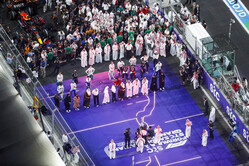


01/03/2023
NEWS STORY
 The Bahrain Institute for Rights and Democracy has called on F1 drivers to help steer the sport away from a "moral vacuum".
The Bahrain Institute for Rights and Democracy has called on F1 drivers to help steer the sport away from a "moral vacuum".
The call, which comes at a time drivers have been demanding the right to speak out on various issues following a move by the FIA to prevent them using the sport for activism, comes in the days preceding the season opening races in Bahrain and Saudi Arabia, countries which have history in terms of human rights violations.
In addition to these two events, later in the year the sport returns to Qatar, though there are numerous other countries on the schedule which have poor records on human rights.
Paul Scriven, a member of the House of Lords, told a news conference organised by the Bahrain Institute for Rights and Democracy (BIRD) that F1 is at a "fork in the road".
"There are two roads that F1 can now take," he said. "One is a road which is a moral vacuum where the leaders and the administrators seem to going. There is another road that some drivers seem to be taking, who understand they can use their platform and their sport not just for sport's sake but for good and for change and that they cannot ignore the human rights abuses in the country that they are driving in."
In its pursuit of cash, in recent years F1 has increasingly turned to the Middle East, and many believe that some nations are using F1 to 'sportswash' their images and reputations.
BIRD claims that since last year's races in Bahrain and Saudi Arabia, human rights in the two countries have been "increasingly trampled on", and accused the sport of facilitating the "sportswashing of abuses".
The group has written to F1 CEO, Stefano Domenicali, calling on him to use "all available leverage" in a bid to seek the release of jailed activists.
According to a statement read out by Mr Scriven, there are currently 12 activists facing the death penalty in Bahrain.
He added that he believes drivers would be fully justified in refusing to race in certain countries if F1 failed to put in place a proper ethical framework.
Speaking to The Guardian, Domenicali insists that the sport is best placed to effect change, claiming that in Saudi Arabia, for example, the arrival of F1 is having an impact.
"We would walk and they know that," he said. "They know very well it is in the contract. That's why for them this is a spotlight that is beneficial to them to showcase that they want to change."
Claiming that the sport employs independent auditors to assess human rights in each country and ensure they meet F1's strict guidelines, he insists that a confrontational approach would be wrong.
"F1 is much stronger to do what we are doing because we are there, to be there to monitor what they are doing," he said. "I truly believe in keeping the pressure in the right way, because what I have learned is that if you want to be respected by people who think differently from you, the best way is not to shout at them.
"We don't have to create barriers. Sport can be good in finding the point of connection, of contact, instead of the point of difference."
Told that BIRD claims that F1 failed to conduct a proper due diligence assessment of human rights in Bahrain before awarding a new contract and that "forced disappearances, extrajudicial killing and torture" continue, Domenicali said: "I would say that's not what we see, it's a difference on vision and opinion.
"We feel totally confident of the reports we are receiving from independent auditors that there is not any signs that are confirming the kind of things that some groups are saying.
"We see a country that is very keen to be open in discussion but they have their own duty, their own independence in which we cannot be involved. Otherwise in every country we would be discussing the governing process of a country."
With Saudi Arabia and Qatar pouring £42m each into F1's coffers, and Bahrain and Abu Dhabi not much less, one cannot help think of Mrs Merton's (Caroline Ahern) infamous question to Debbie McGhee, wife of the late magician, Paul Daniels. "So, what first attracted you to the millionaire Paul Daniels?"
However, Domenicali denies this.
"At this moment the sport is so strong that we have a lot of options to go elsewhere," he said. "The idea, that it is money that leads, is not the only one. Because the money could be given by other countries who are ready to come, offering the same amount. Absolutely we could take it elsewhere because of the demand.
"If you put blinkers on, to say: 'I don't care, because I am not interested in being there', it's not recognising the world of today," he adds. "I am there to personally build physical relations, a point of communication and of understanding the different sensibilities of certain cultures."